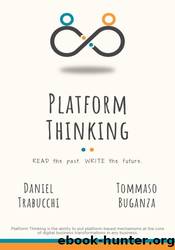Platform Thinking by Daniel Trabucchi

Author:Daniel Trabucchi [Trabucchi, Daniel]
Language: eng
Format: epub
Published: 2023-04-28T00:00:00+00:00
Figure 4.6 e-ethnography
This is exactly what happens in this type of platform, observingâ albeit in the background, hence the name e-ethnographyâthe user and having the possibility to innovate the core products based on the insights collected.
This mechanism, the information collected on the usage of a product such as in this case shoes, allows capturing value without direct monetization, justifying the free service.
Itâs not easy to find examples of companies using apps in this way, as thereâs often no clear evidence of it from the outside, but itâs important to consider it among the strategies we can use to capture value from the data in a platform.
Another example? It seems that Netflix uses data on its usersâ habits and the programs they watch, when they pause, how long it takes them to finish a series, and what basket of movies and TV series a person sees, not only to decide whether to renew a series, but also to understand what kind of products users are looking for, turning them into valuable inputs for generating new contents. The declaration on the decision to bid on the American version of House of Cards became popular, after seeing the pilot episode directed by David Fincher and played by Kevin Spacey. In Netflix, they had the chance to analyze the results of the English version of House of Cards and to match those data with the performances of the previous movies by David Fincher and of the previous movies starring Kevin Spacey:
We have a high degree of confidence in [House of Cards] based on the director, the producer, and the starsâ¦. We donât have to spend millions to get people to tune into this. Through our algorithms, we can determine who might be interested in Kevin Spacey or political drama and say to them âYou might want to watch this.â (Steve Swasey, VP of Corporate Communications, in an interview with Gigaom)3
This is an early example of how the data gathered through the main service influenced the production function in Netflix to pick or not to pick a series. Similar reasonings followed for which original content to create, what to renew for more seasons, and so on.
Nike+ and Netflix are great cases of platform-oriented e-ethnography since they rely on the power of data to offer a service to another area of the organization they are offered by. Still, the power of data may go far beyond that and may be perused also for other players in the platform ecosystem. That is the case of Spotify. Spotify is a transactional two-sided platform which connects listeners to artists. Leveraging the data collected during the delivery of the service, they created in 2013 a specific add-on service called Spotify for Artist, to offer a set of insights to the artists about how listeners enjoy their songs, for how long, after how long they change songs, and so on. In other words, they have opened data to artists, helping them to understand the value embedded in what Spotify knows about the streams they get.
Download
This site does not store any files on its server. We only index and link to content provided by other sites. Please contact the content providers to delete copyright contents if any and email us, we'll remove relevant links or contents immediately.
Hit Refresh by Satya Nadella(9132)
The Compound Effect by Darren Hardy(8964)
Change Your Questions, Change Your Life by Marilee Adams(7780)
Nudge - Improving Decisions about Health, Wealth, and Happiness by Thaler Sunstein(7706)
The Black Swan by Nassim Nicholas Taleb(7128)
Deep Work by Cal Newport(7082)
Rich Dad Poor Dad by Robert T. Kiyosaki(6631)
Daring Greatly by Brene Brown(6512)
Principles: Life and Work by Ray Dalio(6445)
Playing to Win_ How Strategy Really Works by A.G. Lafley & Roger L. Martin(6299)
Man-made Catastrophes and Risk Information Concealment by Dmitry Chernov & Didier Sornette(6019)
Big Magic: Creative Living Beyond Fear by Elizabeth Gilbert(5771)
Digital Minimalism by Cal Newport;(5764)
The Myth of the Strong Leader by Archie Brown(5507)
The Slight Edge by Jeff Olson(5415)
Discipline Equals Freedom by Jocko Willink(5389)
The Motivation Myth by Jeff Haden(5212)
The Laws of Human Nature by Robert Greene(5208)
Stone's Rules by Roger Stone(5087)
